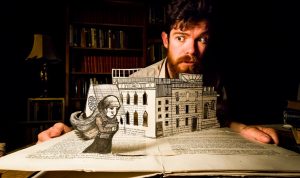 After an ambitious, difficult, near-miss Friday night in Steel Hammer, it was a real pleasure to see The Bookbinder yesterday afternoon at the recently refurbished Yale Center for British Art. An inventive one-man-plus-one-book show that’s traveled all the way from New Zealand’s Trick of the Light Theatre Company to New Haven, The Bookbinder serves up its pleasures easily and generously. A mysterious book-binder needs an apprentice! An old woman arrives with an old and illegible book, a page of which our hero damages in the act of repair! A fantasy world inside the book into which our hero falls after burning the missing page so that his crime can’t be found out!
After an ambitious, difficult, near-miss Friday night in Steel Hammer, it was a real pleasure to see The Bookbinder yesterday afternoon at the recently refurbished Yale Center for British Art. An inventive one-man-plus-one-book show that’s traveled all the way from New Zealand’s Trick of the Light Theatre Company to New Haven, The Bookbinder serves up its pleasures easily and generously. A mysterious book-binder needs an apprentice! An old woman arrives with an old and illegible book, a page of which our hero damages in the act of repair! A fantasy world inside the book into which our hero falls after burning the missing page so that his crime can’t be found out!
You can fill in the rest, maybe, if I tell you that it involves a voyage across a strange land, a nest of hungry eagle chicks and their soon returning mother, a girl who oddly resembles the old woman who brought the book to the store, a ship, a storm, and a desperate act of book-and-landscape repair involving a linen thread, a knife made from human bone, and the handkerchief that our hero’s gruff father gave him at the start of the story.
An elaborate pop-up book guides us through the story, supported by several dolls, some shadow puppets, and a few other props and light tricks. Ralph McCubbin Howell’s performance of a script that he co-wrote with director Hannah Smith is delightful, funny, and spooky.
The show left me thinking about how, in an age of digital media, we are rediscovering to the book as object and technological marvel — though really The Bookbinder’s interest in the craft of binding wasn’t all that technical. I also thought about the difference between the kind of socially contextualized critical perspectives that theater for adults wants to create — the raunchy high-spirits of Our Ladies, the graceful and forceful protest of Abraham.in.Motion, the inchoate rage and longing that suffused Steel Hammer — and the more abstract darkness, which perhaps really just emerges out of a child’s fear of the dark, of a play designed for younger audiences.
I value difficult and experimental work, but there’s something powerfully cleansing about a deep plunge into a child’s imagination. I spend lots of time in my own work historicizing and contextualizing the notion of being “lost in a book,” but sometimes that immersive experience really is what we most enjoy.
Leave a Reply